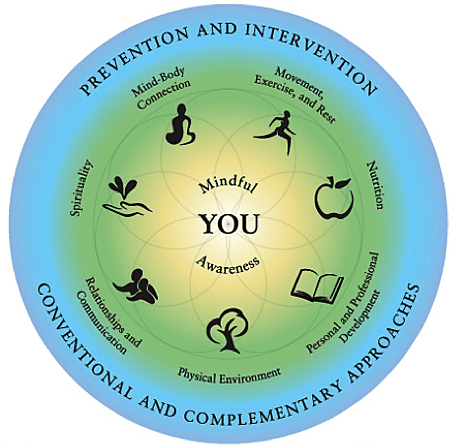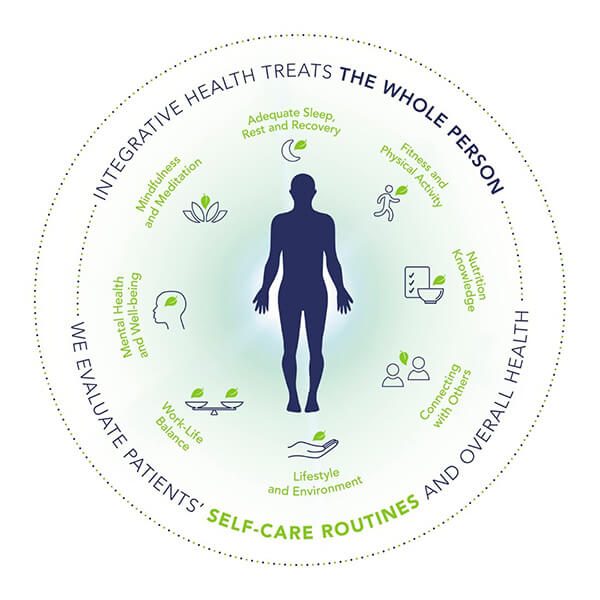In today’s fast-paced world, the pursuit of health and wellness has become a priority for many individuals seeking balance and vitality in their lives. While traditional medicine plays a crucial role in addressing health concerns, there’s a growing recognition of the benefits of integrative approaches that encompass both conventional and alternative modalities. Let’s delve into the essence of integrative health and explore how it can empower individuals to achieve holistic well-being.
Integrative health revolves around the concept of treating the whole person – mind, body, and spirit – rather than merely addressing symptoms. This approach emphasizes the interconnectedness of various aspects of health and recognizes the influence of lifestyle, environment, and mindset on overall well-being.

Key Components of Integrative Health:
- Nutrition and Dietary Support: Proper nutrition forms the cornerstone of integrative health, with an emphasis on whole foods, plant-based diets, and mindful eating practices. Nutritionists and dietitians work collaboratively with individuals to develop personalized dietary plans tailored to their unique needs and goals.
- Mind-Body Practices: Techniques such as yoga, meditation, tai chi, and mindfulness-based stress reduction (MBSR) are integral components of integrative health, promoting relaxation, emotional balance, and mental clarity. These practices facilitate a deeper connection between mind and body, fostering resilience and self-awareness.
- Complementary Therapies: Integrative health embraces a diverse range of complementary therapies, including acupuncture, chiropractic care, massage therapy, and herbal medicine. These modalities complement conventional treatments and offer alternative avenues for managing pain, reducing stress, and enhancing overall wellness.
- Physical Activity and Exercise: Regular physical activity is essential for maintaining optimal health and vitality. Integrative health encourages a holistic approach to fitness, encompassing a variety of activities tailored to individual preferences and abilities, from yoga and Pilates to strength training and outdoor recreation.
- Stress Management and Resilience Building: In today’s hectic world, stress has become a pervasive health concern, impacting both physical and mental well-being. Integrative health emphasizes the importance of stress management techniques and resilience-building strategies, empowering individuals to navigate life’s challenges with greater ease and equanimity.
Benefits of Integrative Health:
- Enhanced Well-being: By addressing the underlying causes of health issues and promoting lifestyle changes, integrative health fosters a profound sense of well-being and vitality.
- Personalized Care: Integrative practitioners take a holistic approach to patient care, considering each individual’s unique needs, preferences, and goals.
- Empowerment and Self-Care: Integrative health empowers individuals to take an active role in their health journey, providing them with the knowledge and tools to make informed choices and cultivate lifelong habits of self-care.
In conclusion, integrative approaches to health and wellness offer a comprehensive framework for promoting holistic well-being, encompassing the physical, emotional, and spiritual dimensions of health. By integrating conventional medicine with complementary therapies and lifestyle interventions, individuals can embark on a journey of self-discovery and transformation, reclaiming their health and vitality in the process.
Keywords: integrative health, holistic wellness, mind-body practices, complementary therapies, nutrition, stress management, personalized care, self-care, holistic approach, well-being.
Also Read:
- Discovering Joy: Finding Hobbies and Activities that Bring Fulfillment
- Building a Sanctuary: Creating a Healthy Home Environment for Well-being
- Unlocking the Power of Quality Sleep: Strategies for Better Mental Health
- Seeking Professional Help for Mental Health: Therapy, Counseling, and Support Groups
- The Crucial Role of Self-Care and Self-Compassion in Nurturing Well-being
- Building Resilience and Emotional Well-being: Strategies for Thriving in Adversity

